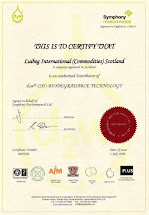Oxo-degradable producer hits back at European Bioplastics' attack
Symphony Environmental has responded sharply to yesterday's condemnation by European Bioplastics of oxo-degradable additives. It calls the European Bioplastics charges "both ill-founded and unjust" and points out that European Bioplastics is the lobby for hydro-biodegradable or “compostable” plastics and that its attack is based on commercial interest.
Far from oxo-biodegradable plastics not being verified by standard specifications, Symphony says they can be assessed for degradability, bio-degradability and non eco-toxicity by ASTM D6954-04. Claims that oxo-biodegradable plastics could encourage people to drop litter can equally be applied to hydro-biodegradable plastics, says Symphony – and "oxo-bio will harmlessly self-destruct if it gets into the open environment. Hydro-bio will not completely degrade unless someone collects it and puts it into a composting facility."
And the claim that fragments remain in the environment has been proven untrue: "after the oxo-bio additive has reduced the molecular-weight to 40,000 Daltons or less it is no longer a plastic, and biodegrades in the same way as leaves and straw."
European Bioplastics' reference to an attempt by the oxo-biodegradable industry to "water down the criteria of EN 13432" was not to enable oxo-biodegradable materials to meet the standard, says Symphony. Rather that European Bioplastics "fought to prevent the amendment of EN13432 because it has a commercial interest against a European Standard with tests appropriate to oxo-bio.
"Composting is not the same as biodegradation in the environment - it is an artificial process operated according to a much shorter timescale than the processes of nature. Therefore, standards such as EN13432, ISO 17088, and their American (ASTM D6400) and Australian (AS 4736-2006) equivalents, designed for compostable plastic, cannot be used for plastic which is designed to biodegrade if it gets into the environment. The hydrobio industry has consistently lobbied for standards and legislation which give its product an artificial advantage, and has consistently blocked proposals for change."
Symphony concludes: "Composting of organic waste makes sense, but compostable plastic does not. It is up to 400 per cent more expensive than ordinary plastic. It is thicker and heavier and requires more trucks to transport it. If buried in landfill, compostable plastic will emit methane (a greenhouse gas 23 times more powerful than CO2) in anaerobic conditions. It is definitely not a 'green' alternative."
Source: britishplastics.co.uk
Friday, 24 July 2009
Subscribe to:
Post Comments (Atom)



No comments:
Post a Comment